
I read this morning that our concern with buildings and institutions named after dubious historical figures had found a new object—John C. Calhoun, the imposing South Carolinian who played a pivotal role in the nullification controversies in the early nineteenth century. It turns out that Clemson University, built in part on his land after a Clemson married a Calhoun, has both a building and a college named after him. More surprisingly, Yale University boasts (well, not any more) a Calhoun College.
We’re still in the early stages of seeking out problematical names. Consider Georgia, my home state, and its neighbors North and South Carolina. They’re named after British monarchs who countenanced the slave trade. Indeed, shouldn’t every place, building, or institution named after a member of the British royal family be renamed? Prior to the British campaign against the slave trade, they were all complicit in one way or another. I suppose that we should also change the name of our country, since Amerigo Vespucci was surely an imperialist.
Then there are our presidents. Prior to Abraham Lincoln, they either owned slaves or acquiesced to the existence of slavery. No more Washington, Jefferson, Madison, or Monroe (Virginians and slaveholders all). No more Adams(es), Jackson, Van Buren, Harrison, Tyler, Polk, Taylor, Fillmore, Pierce, or Buchanan. Then there’s the sainted (oops! shouldn’t say that) Lincoln. But he said this (trigger warning):
I will say then that I am not, nor ever have been, in favor of bringing about in any way the social and political equality of the white and black races, that I am not, nor ever have been, in favor of making voters or jurors of negroes, nor of qualifying them to hold office, nor to intermarry with white people; and I will say in addition to this that there is a physical difference between the white and black races which I believe will forever forbid the two races living together on terms of social and political equality. And inasmuch as they cannot so live, while they do remain together there must be the position of superior and inferior, and I as much as any other man am in favor of having the superior position assigned to the white race.
It looks like he’ll have to go, too. But then, so will most Democratic politicians who served before the passage of the 1964 Civil Rights Act. And Franklin Delano Roosevelt, who authorized the internment of Japanese-Americans during World War II.
Actually, We Just Need to Erase History
In fact, if you think about it, virtually everyone who lived before the present probably held opinions of one sort or another that we (at least some of us) find offensive. They were (conscious or unconscious) racists, sexists, religious bigots, or homophobes. How can we continue to honor anyone who hasn’t at least had the opportunity to recant an opinion to which we now object? They all went to their graves holding opinions no one would now utter in polite company.
In other words, history can’t really provide us with place or building names. And let’s also not forget religiously exclusive names like St. Augustine, St. Louis, San Francisco, San Antonio, San Diego, and Los Angeles. Wouldn’t non-Christians feel unwelcome in a place named after a saint or the angels?
So what are we to do? I suppose we could hand over naming responsibilities to the people who come up with the meaningless yet evocative model names for automobiles. We could have city, state, and building names like Sentra, Acura, and Elantra. Or we could restrict ourselves to the names of politicians and other public figures who have seen the light, which in practice means people born in the 1950s or later. There problem there is that they may currently hold opinions that will offend our grandchildren. Perhaps every place or building name should come with an expiration date: you get, not 15 seconds of fame, but, say, 20 years.
Now that would be progress, that is, the progressive overcoming of the dead hand of the past, honoring and remembering only those who contributed to our transient and strictly speaking meaningless (because self-defined) perfection.
Oh, brave new world!









